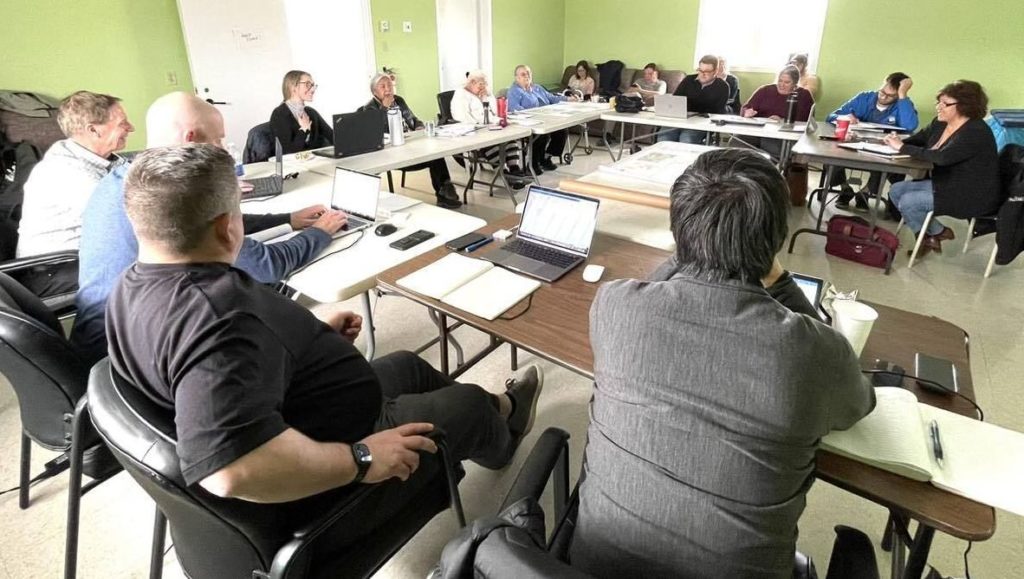The leaders of Paqtnkek Mi’kmaw Nation (pronounced BUCK-in-keg MEEG-maw) in Nova Scotia are excited about being in on the ground floor working with the First Nations Infrastructure Institute (FNII).
During the past two years, FNII technical director Jason Calla and colleagues have participated in a working group on a strategy for a robust water and wastewater system in this community of 400 on-reserve members. The original reserve with more than 105 homes on the north side of the TransCanada Highway has had issues with its water supply and quality for years, including frequent boil water advisories and water rationing. Add the property on the south side now being developed for commercial and residential growth, and water management quickly jumps to the top of the Nation’s infrastructure queue.
Paqtnkek’s Council – along with the Nation’s business arm, Bayside Development Corporation – is planning further development in both areas. It would include new residential subdivisions, a four-storey corporate office, boutique motel, industrial and commercial lots and green space. In recent community meetings, members also suggested youth and sports facilities, active recreational trails and even a theatre.
Paula Paul, the Band’s lands coordinator, frequently updates the working group on the community’s developing land use strategy.
“Our project with FNII has opened a new perspective on building from the ground up,” she says. “For too long we have been dealing with an antiquated system of ‘Oh, that is good enough.’ Well, it’s not, and FNII is helping to bridge that gap. We are very fortunate to be working with the team and look forward to what comes next.”
Jason Calla is often accompanied on the Maritime trips by FNII Technical Team members John Dumbrell and Jason Reeves. The project has grown to include other Band staff, Indigenous Services Canada, the Atlantic First Nations Water Authority, Dillon Consulting and others. Great progress, considering that it was only a few years ago when Jason heard Rose Paul speak at a national conference about her vision for community prosperity.
Once blocked by bureaucrats from developing its own land across the highway, Paqtnkek quickly understood that it would need to forge relationships with the key First Nations Fiscal Management Act (FMA) institutions to lay the foundation for growth. Rose Paul, then director of lands and economic development, made the connections and brought FMA leaders to the community. With the support of the membership, she led the complicated negotiations for a $15 million highway interchange, complete with roundabout, road extensions, bridges and room for future twinning.
For years, traffic whizzed by on the TransCanada not even aware that a Mi’kmaq community even existed mere metres away. Today, the new exit draws truckers, tourists and regional traffic to the new $14 million Bayside Travel Centre. The highway showcase includes an Esso Commercial Card Lock, retail fuel bay, Bayside convenience store, Nova Scotia Liquor Corporation outlet (first in a Mi’kmaq community), Tim Hortons, Mary Brown’s Chicken, Bayside Entertainment Centre with provincially-licensed video lottery terminals, a By-the-Bay Visitor Information Centre, and a private truckers’ lounge.
“We’ve come a long way since being told we could only have a small triangle of land to sell beads and trinkets,” said Rose. “With the help of FNII, strong financial management training, and our own land code, we’re taking control of our destiny.”
Rose has since added CEO of Bayside Development Corporation to her resumé, and works closely with a growing list of corporate partners, including: EverWind Fuels (green hydrogen/ammonia), Goldboro Gold, Maritime Launch (rocket base), Sodexo and many others. Bayside, despite being only three years old, has already won Ulnooweg’s ‘Atlantic Canadian Indigenous Business of the Year’ award and a major regional tourism award.
Darlene Paul, director of capital and housing, credits FNII with providing the big-picture planning needed to ensure the necessary elements of successful long-term infrastructure growth.
“Our view is that we’re not building just for the sake of building,” she said. “It’s all about supporting future needs in health care, education and recreation. And generating business income to create self-sufficiency.”
Despite the need to dig deep into the technical aspects of infrastructure, the FNII members around the table have also shown a capacity for understanding the ‘soft’ skills of team development. It’s that relationship-building based on trust and transparency that will be critical as the institute plans its future as a new institution governed by the Fiscal Management Act.
It has certainly turned out to be a win-win for both the FNII team and leaders at Paqtnkek who are using infrastructure to benefit their progressive community for years to come.
For more information, visit www.paqtnkek.ca and www.baysidecorporate.com.

